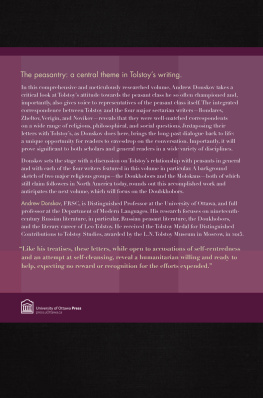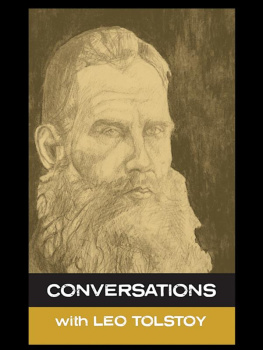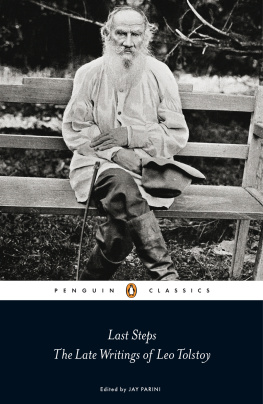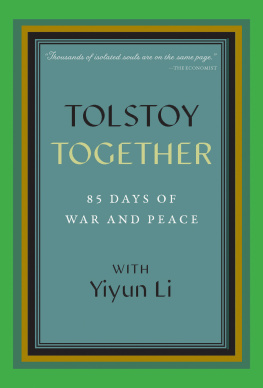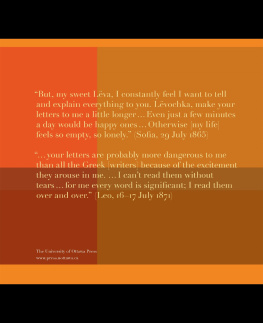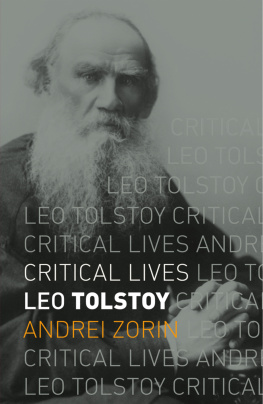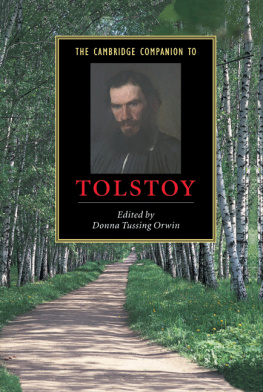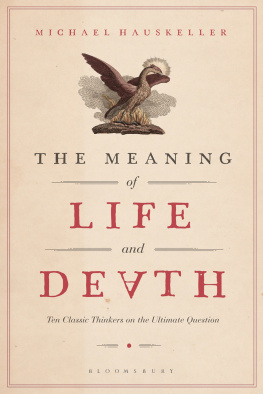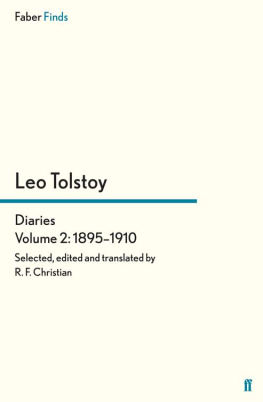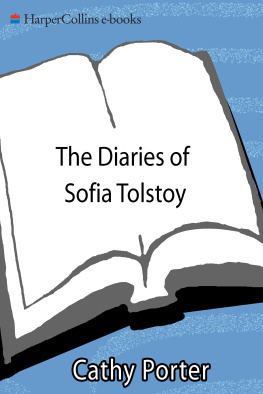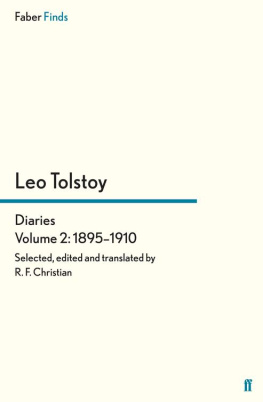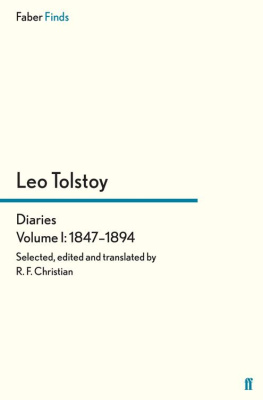Table of Contents
Landmarks
Page List

LEO TOLSTOY
in Conversation with
FOUR PEASANT
SECTARIAN WRITERS

The University of Ottawa Press (UOP) is proud to be the oldest of the francophone university presses in Canada and the only bilingual university publisher in North America. Since 1936, UOP has been enriching intellectual and cultural discourse by producing peer-reviewed and award-winning books in the humanities and social sciences, in French or in English.
Library and Archives Canada Cataloguing in Publication
Title: Leo Tolstoy in conversation with four peasant sectarian writers / edited by Andrew Donskov; letters compiled by Liudmila Gladkova; correspondence translated from the Russian by John Woodsworth.
Names: Donskov, Andrew, 1939- editor. | Gladkova, L. V., 1955- compiler. | Woodsworth, John, 1944- translator. | Container of (work): Tolstoy, Leo, graf, 1828-1910. Correspondence. Selections.
Description: Includes bibliographical references and index. Identifiers: Canadiana (print) 20190079738 | Canadiana (ebook) 20190079789 | ISBN 9780776627793 (softcover) | ISBN 9780776627809 (PDF) | ISBN 9780776627816 (EPUB) | ISBN 9780776627823 (Kindle)
Subjects: LCSH: Tolstoy, Leo, graf, 1828-1910Correspondence. | LCSH: Authors, Russian19th centuryCorrespondence. | LCSH: PeasantsRussiaCorrespondence. | LCGFT: Personal correspondence.Classification: LCC PG3379.A2 E5 2019 | DDC 891.73/3dc23
Legal Deposit: Second Quarter 2019
Library and Archives Canada
Printed and bound in Canada
Copy editing
Proofreading
Typesetting
Cover design | Robbie McCaw
Robert Ferguson
discript enr.
John van der Woude and Elizabeth Schwaiger |
The University of Ottawa Press gratefully acknowledges the support extended to its publishing list by Canadian Heritage through the Canada Book Fund, by the Canada Council for the Arts, by the Ontario Arts Council, by the Federation for the Humanities and Social Sciences through the Awards to Scholarly Publications Program, and by the University of Ottawa.

To Natalia, my beautiful wife,
the love of my life,
for her constant counsel,
unconditional support and patience
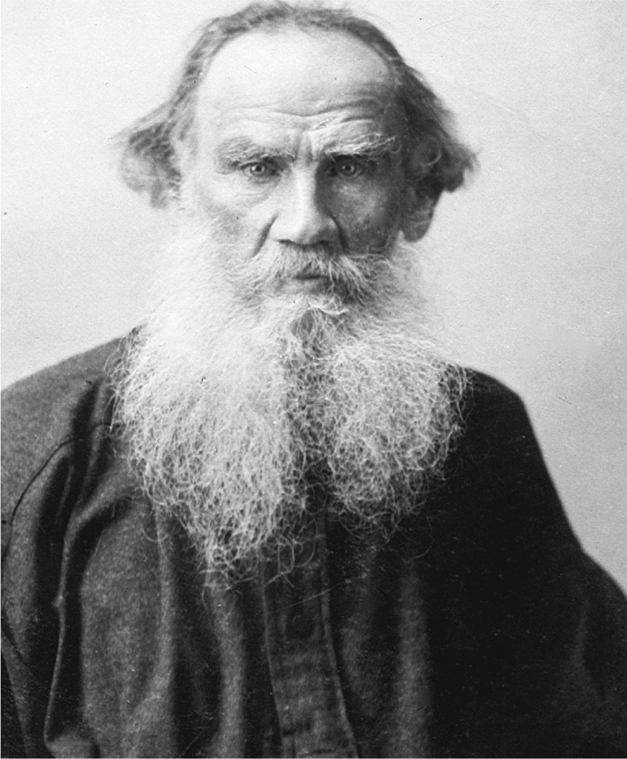
Lev Nikolaevich Tolstoy
TABLE OF CONTENTS
The present volume of Leo Tolstoys correspondence with four major peasant sectarian writers constitutes an expanded edition of a volume published in 2008 under my editorship by the Slavic Research Group at the University of Ottawa. Before that, many of these letters, as well as some other pertinent materials, had appeared in a variety of publications (in either their Russian original or Woodsworths translation) in Russia, Canada and Germany. This new edition includes an additional forty-four letters, published here for the first time in any language twenty-two by Bondarev and twenty-two by Novikov all newly translated by John Woodsworth, who also translated the correspondence in the earlier edition. Moreover, previously published letters and their annotations have been updated for accuracy.
Not only is such a publication historically important and useful to religious groups such as the Molokans in America and the Doukhobors in Canada, but it fills a lacuna in an area of Tolstoy studies which remains under-investigated in both Russia and the West.
As the prominent American anthropologist Ethel Dunn (2001) states in her preface to the English translation of the Tolstoy-Zheltov correspondence (and equally applicable to the other letters in this volume), In our more secular times it is hard to realize the importance of religion in the lives of Russian peasants and even the Russian educated classes at the end of the nineteenth and beginning of the twentieth century.
The juxtaposition of Tolstoys letters with those of his four sectarian makes them even more significant by showing them in their original context of a dialogue, or conversation.
For many years Tolstoy sought the meaning of life, particularly in the peasantry, and learnt a great deal from his conversation with them through these exchanges not only superficial traits of their culture but, more importantly, how they thought and reflected, as members of their class, presenting what may be seen as an inside view on important questions of life, death and turn-of-the-century Russian society.
The integrated correspondence presented here offers a unique insight into the minds of five spiritual thinkers as they engage in an earnest discussion on a wide spectrum of religious, philosophical and social questions, and thus should prove of significance to scholars and general readers interested in a wide variety of disciplines Slavic studies (especially Tolstoy studies), European history, philosophy, sociology and religious studies, to name but a few.
To present the conversation in an even broader context, I briefly discuss Tolstoys relationship with peasants in general, as well as with each of the four individual writers. In addition, I have provided a background sketch of the two major religious groups represented (which Verigin and Zheltov respectively identified with), the Doukhobors and Molokans, both of which still claim sizeable populations of followers in North America today. Members of these groups may be particularly interested in exploring a fascinating aspect of their heritage through studying the materials presented. Bondarevs Sabbatarian connection, on the other hand, did not last long and was tenuous at best. And while Novikov experimented with various sects, he remained largely without any kind of group affiliation.
All the Russian texts translated in this collection have been verified against the original manuscripts a process that has helped fill in a multitude of lacun (including simple oversights by proofreaders and what could be deliberate omissions by censors) as well as correct earlier misreadings.
Note that the name Leo Tolstoy is the anglicized variant of the authors Russian name Lev Nikolaevich Tolstoy [ ]. Both the Lev and Leo variants are used interchangeably throughout the text.
Titles of Tolstoys works (both books and articles) are cited throughout the text in italics, and in English only. See Index of Tolstoy titles for their original Russian titles.
I should like to express my appreciation to the L.N. Tolstoy State Museum, in Moscow; to its former director, Vitalij Borisovich Remizov, for his unwavering support; to its current director, Sergej Aleksandrovich Arkhangelov and to Vladimir Ilich Tolstoy, director of the Tolstoy Museum Estate at Yasnaya Polyana, for providing valuable materials; to the staff of the Bogorodsk District Museum for supplying me with a number of important documents on the life of Fdor Zheltov.
My heartfelt gratitude goes out to Liudmila Viktorovna Gladkova, who is both senior researcher at the Russian Academy of Sciences Institute of World Literature (Moscow) and associate director of the L.N. Tolstoy State Museum, for compiling Zheltovs and Novikovs letters in their original Russian, as well as for a number of commentaries. And to Dr. Marina Shcherbakova, head of Russian Classical Literature at the same institute of the Russian Academy of Sciences, for sharing her extensive knowledge on Russian sectarianism.

